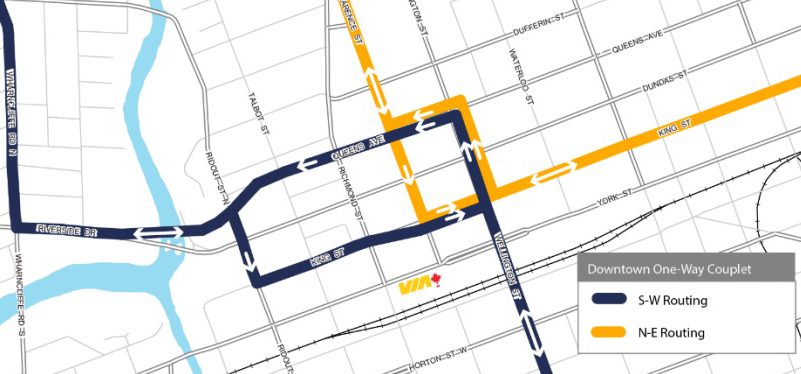London’s plans for bus rapid transit appear to be making a major detour, with city staff saying council should drop a controversial tunnel below Richmond Row, as part of bus rapid transit recommendations announced Friday.

During a media conference, city engineer Kelly Scherr said the estimated capital cost of the tunnel had gone up to $170 million, up from the previously estimated $90 million.
“When we advanced the design work, we asked our team to go from doing a planning level estimate to a quantities-based estimate specific for this location, so there were a lot of changes through all the components of that tunnel. The stations, ventilation, fire and life safety, excavation, cost, labour, and materials all changed, and it adds up.”
READ MORE: New survey suggests majority of respondents opposed to BRT plan
Instead, staff are recommending a Richmond Street corridor with an at-grade intersection at the Oxford Street intersection, where rapid transit buses will have to wait when trains are going by.
“A typical delay that we experience at Richmond St. is about five minutes on average … and there will be delays. And it absoloutely does mean that the reliability of that leg is not what it would have been, with a grade separation with the tunnel.”
According to City Manager Martin Hawyward, the city had conversations with CP Rail about moving the train tracks elsewhere.
“There is not a desire on the part of CP to relocate. And it would be very very expensive to do, and we’re talking billions.”
Mayor Matt Brown has been a vocal advocate for the tunnel in the past, saying there was evidence to support its construction. When asked if he still supported the significant excavation under Richmond Row Friday, Brown was unable to give a yes or no answer.
“I’ve always said we need to make decisions that are based on evidence,” Brown told AM980. “A whole lot more information is now available. The price tag has gone up substantially. We need to look at this information, we need to consider it, and we need to make sure we’re delivering the right rapid transit system for London.”
READ MORE: Timeline: London bus rapid transit
The report also recommends a couplet on King Street and Queens Avenue, because it balances out the impacts and benefits, and eases concerns about loss of downtown parking and traffic congestion.
“But it does create some other challenges,” said Scherr, of the recommended couplet.
“For transit users and transit operators, it’s less preferred. We don’t have people getting on and off buses at the same place, so that can require some wayfinding … and we know that can present a challenge for people with accessibility needs as well.
The price tag for the project is now estimated at $440 million. If approved, Scherr is hoping to update the bus rapid transit plan business case by July.
The recommendation will go before city hall on May 15 and 16 when councillors are expected to make a final decision on rapid transit routes.








Comments